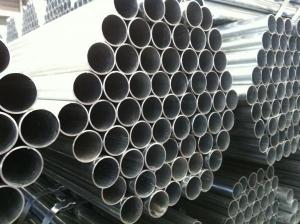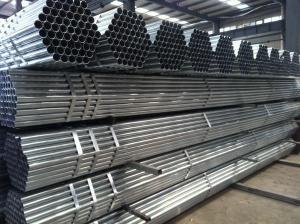Q345 Pre-Galvanized Pipe2
- Loading Port:
- Tianjin
- Payment Terms:
- TT or LC
- Min Order Qty:
- 50MT m.t.
- Supply Capability:
- 5000 Tons Per Month m.t./month
OKorder Service Pledge
Quality Product, Order Online Tracking, Timely Delivery
OKorder Financial Service
Credit Rating, Credit Services, Credit Purchasing
You Might Also Like

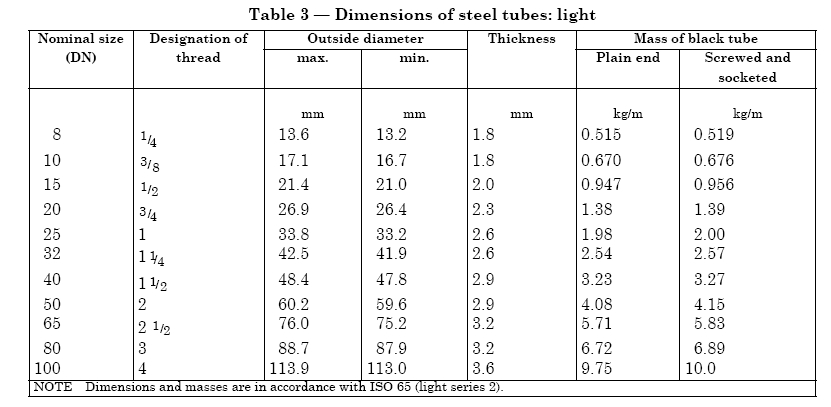
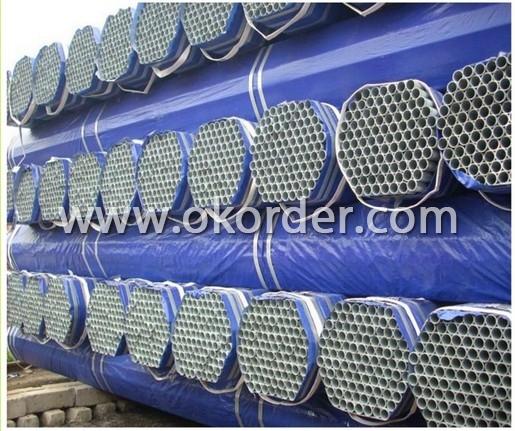
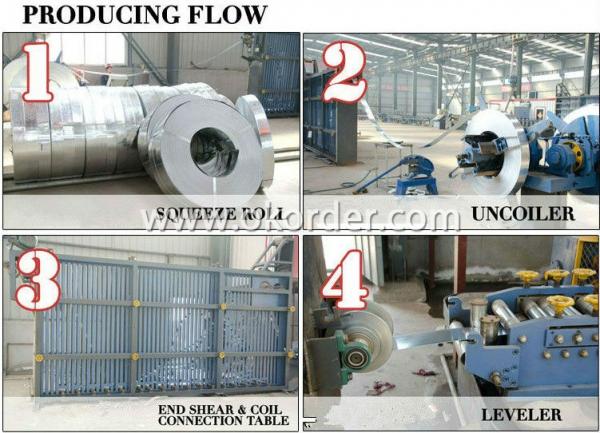
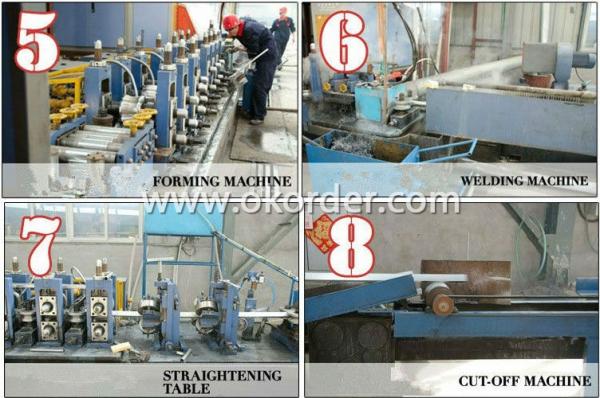

- Q:How are steel pipes measured and labeled?
- Steel pipes are typically measured and labeled based on their nominal pipe size (NPS), which refers to the inner diameter of the pipe. This measurement is expressed in inches or millimeters. Additionally, steel pipes are often labeled with their schedule or wall thickness, which is represented by a numerical value. The labeling also includes the pipe material, such as carbon steel or stainless steel, and may include other specifications and markings as required by industry standards and regulations.
- Q:What are the different types of gaskets used with steel pipes?
- There are several types of gaskets commonly used with steel pipes, including ring type joint (RTJ) gaskets, spiral wound gaskets, and flat gaskets. RTJ gaskets are designed to create a tight seal by compressing between two flanges, while spiral wound gaskets consist of a metal winding and filler material for enhanced sealing properties. Flat gaskets are typically made from rubber or non-metallic materials and are used for lower pressure applications.
- Q:Welded and seamless steel pipe how to distinguish?
- Different processing technology:Seamless tubes are made of quality carbon steel or alloy steel. Processing technology of seamless pipe hot rolling and cold drawing is divided into two ways, and the tube is generally based on welded.
- Q:How are steel pipes used in transportation?
- Steel pipes are commonly used in transportation for various purposes such as the construction of pipelines for oil, gas, and water transportation. They are also used for structural support in bridges, tunnels, and railway tracks. Additionally, steel pipes are utilized in the manufacturing of vehicles, including exhaust systems, chassis, and frames, ensuring durability and reliability in transportation infrastructure.
- Q:What is the standard length of a steel pipe?
- The standard length of a steel pipe can vary depending on the industry and application. However, in general, the standard lengths of steel pipes range from 18 to 24 feet. These lengths are commonly used in construction, plumbing, and other industrial applications. It is important to note that custom lengths can also be obtained to suit specific project requirements.
- Q:How are steel pipes used in HVAC systems?
- Steel pipes are commonly used in HVAC systems for transporting hot or cold water, as well as other fluids like refrigerants and condensate. They are durable, resistant to corrosion, and can withstand high pressure, making them ideal for carrying fluids throughout the system. Steel pipes are typically used for water supply lines, steam distribution, and hydronic heating and cooling systems in HVAC installations.
- Q:What are the future trends in steel pipe manufacturing?
- Some future trends in steel pipe manufacturing include the adoption of advanced technologies such as automation and robotics, the development of high-performance and sustainable materials, the implementation of efficient and eco-friendly production processes, and the integration of digitalization and data analytics for improved quality control and supply chain management. Additionally, there is a growing focus on the development of specialized pipes for specific industries such as oil and gas, construction, and automotive, as well as an increased emphasis on product customization and tailored solutions to meet the evolving needs of customers.
- Q:Seamless steel tube DN15 specification phi 18*3 what do you mean?
- Seamless steel pipe having a hollow cross section, used as a conduit for conveying fluids, such as pipelines for transporting petroleum, natural gas, gas, water, and certain solid materials. Compared with solid steel such as round steel, steel tube is lighter in strength and equal in resistance to bending and torsion. It is an economical cross section steel and is widely used in the manufacture of structural and mechanical parts.
- Q:What are the different types of steel pipe coatings?
- There are several types of steel pipe coatings, including epoxy coatings, polyethylene coatings, polyurethane coatings, and zinc coatings. These coatings help protect the steel pipes from corrosion, increase their lifespan, and improve their performance in various environments.
- Q:How are steel pipes inspected for quality?
- The quality of steel pipes undergoes a thorough examination process involving diverse techniques and standards. Trained professionals conduct visual inspections to scrutinize the pipes for visible defects such as cracks, dents, or surface irregularities. This examination guarantees that the pipes meet the required specifications and are devoid of any visible flaws. Furthermore, non-destructive testing (NDT) methods are utilized to assess the internal and external quality of the steel pipes. Among the commonly used NDT techniques, ultrasonic testing stands out. This method involves transmitting ultrasonic waves through the pipes to detect any internal defects or inconsistencies in the material. It effectively identifies issues such as variations in wall thickness, inclusions, or weld defects that could compromise the pipe's integrity. Another widely employed NDT technique is magnetic particle inspection. By utilizing magnetic fields and iron particles, this method identifies surface cracks or flaws in the steel pipes. It is particularly effective for detecting defects in ferromagnetic materials and can be performed on both the outer and inner surfaces of the pipes. Moreover, hydrostatic testing is frequently conducted to evaluate the strength and pressure resistance of the pipes. This process involves filling the pipes with water or a suitable fluid and subjecting them to a specified pressure to check for leaks or structural weaknesses. This test ensures that the pipes can withstand the intended operational conditions without failing. In addition to these techniques, various quality control measures are implemented throughout the manufacturing process. These measures include material traceability, dimensional checks, and chemical composition analysis. They play a crucial role in ensuring that the steel pipes meet the required standards and specifications, thereby guaranteeing their quality and reliability. In summary, the inspection of steel pipes for quality involves a comprehensive approach encompassing visual inspection, non-destructive testing methods, and quality control measures. These thorough procedures enable the identification of defects, inconsistencies, or weaknesses, ensuring that the pipes meet the necessary quality standards and are suitable for their intended purpose.
The main production and sale of galvanized steel, the thin-walled high-frequency welded pipe, galvanized pipe, square pipe, rectangular pipe, conduit, EMT conduit, greenhouse pipes, galvanized pipes, and other related products, annual production capacity of 40,000 tons. The company has independent export rights.
1. Manufacturer Overview |
|
|---|---|
| Location | Tianjin ,China |
| Year Established | 2004 |
| Annual Output Value | Above 100milion rmb |
| Main Markets | Main land;Middle East;Southeast Asia |
| Company Certifications | ISO 9001 |
2. Manufacturer Certificates |
|
|---|---|
| a) Certification Name | |
| Range | |
| Reference | |
| Validity Period | |
3. Manufacturer Capability |
|
|---|---|
| a)Trade Capacity | |
| Nearest Port | Tianjin;Qingdao |
| Export Percentage | 41% - 50% |
| No.of Employees in Trade Department | 21-50 People |
| Language Spoken: | English;Chinese |
| b)Factory Information | |
| Factory Size: | 38000squar meter |
| No. of Production Lines | Above 10 |
| Contract Manufacturing | OEM Service Offered;Design Service Offered |
| Product Price Range | High;Average |
Send your message to us
Q345 Pre-Galvanized Pipe2
- Loading Port:
- Tianjin
- Payment Terms:
- TT or LC
- Min Order Qty:
- 50MT m.t.
- Supply Capability:
- 5000 Tons Per Month m.t./month
OKorder Service Pledge
Quality Product, Order Online Tracking, Timely Delivery
OKorder Financial Service
Credit Rating, Credit Services, Credit Purchasing
Similar products
New products
Hot products
Related keywords
